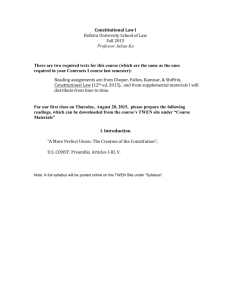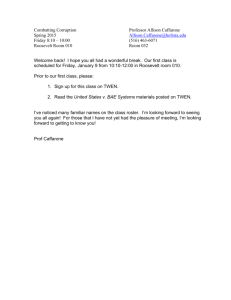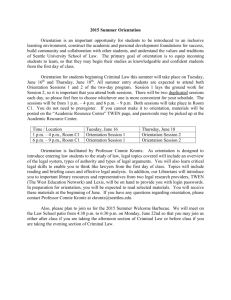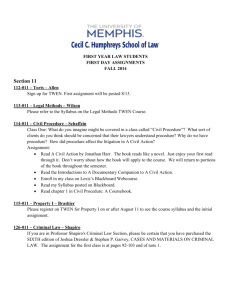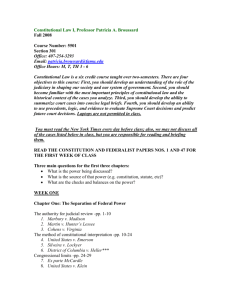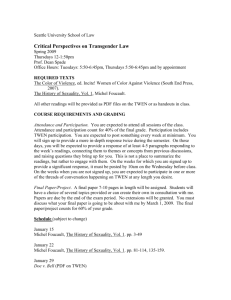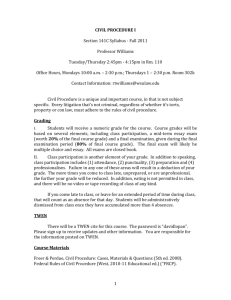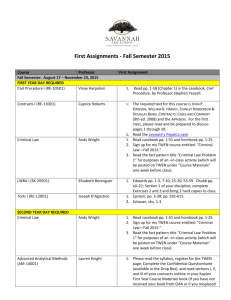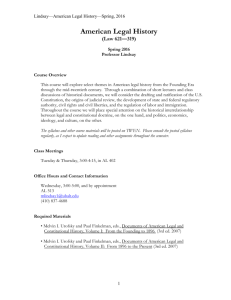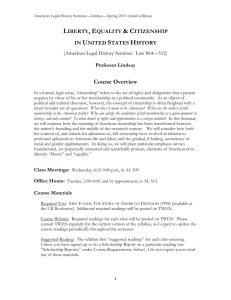CRIMINAL PROCEDURE II TTh 9
advertisement
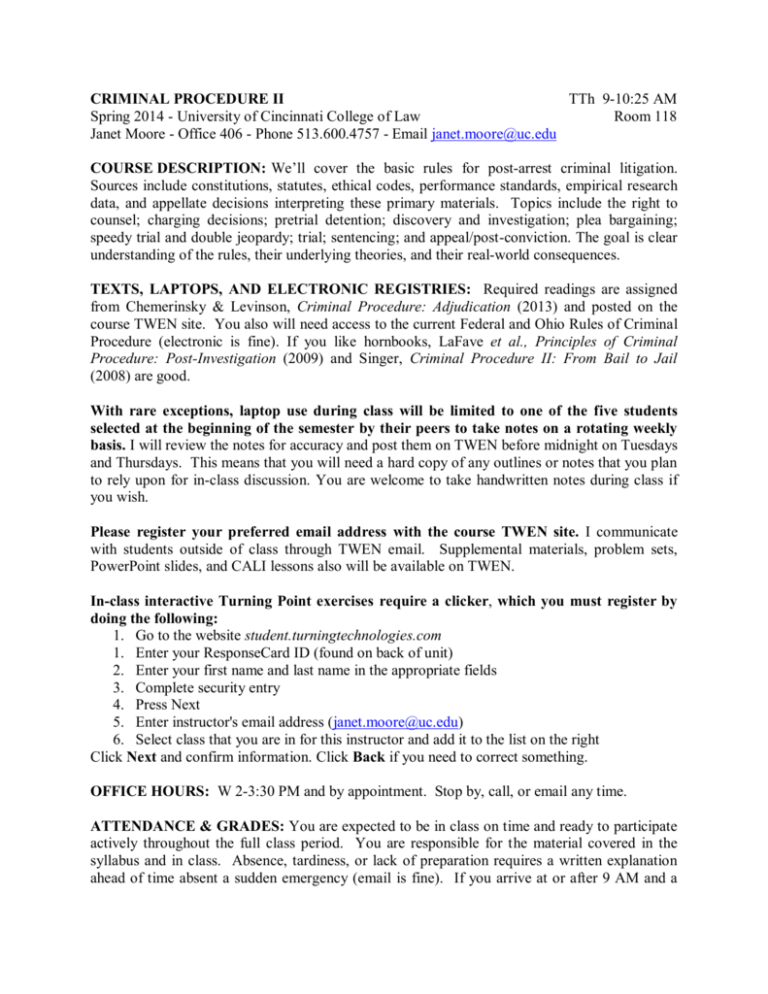
CRIMINAL PROCEDURE II TTh 9-10:25 AM Spring 2014 - University of Cincinnati College of Law Room 118 Janet Moore - Office 406 - Phone 513.600.4757 - Email janet.moore@uc.edu COURSE DESCRIPTION: We’ll cover the basic rules for post-arrest criminal litigation. Sources include constitutions, statutes, ethical codes, performance standards, empirical research data, and appellate decisions interpreting these primary materials. Topics include the right to counsel; charging decisions; pretrial detention; discovery and investigation; plea bargaining; speedy trial and double jeopardy; trial; sentencing; and appeal/post-conviction. The goal is clear understanding of the rules, their underlying theories, and their real-world consequences. TEXTS, LAPTOPS, AND ELECTRONIC REGISTRIES: Required readings are assigned from Chemerinsky & Levinson, Criminal Procedure: Adjudication (2013) and posted on the course TWEN site. You also will need access to the current Federal and Ohio Rules of Criminal Procedure (electronic is fine). If you like hornbooks, LaFave et al., Principles of Criminal Procedure: Post-Investigation (2009) and Singer, Criminal Procedure II: From Bail to Jail (2008) are good. With rare exceptions, laptop use during class will be limited to one of the five students selected at the beginning of the semester by their peers to take notes on a rotating weekly basis. I will review the notes for accuracy and post them on TWEN before midnight on Tuesdays and Thursdays. This means that you will need a hard copy of any outlines or notes that you plan to rely upon for in-class discussion. You are welcome to take handwritten notes during class if you wish. Please register your preferred email address with the course TWEN site. I communicate with students outside of class through TWEN email. Supplemental materials, problem sets, PowerPoint slides, and CALI lessons also will be available on TWEN. In-class interactive Turning Point exercises require a clicker, which you must register by doing the following: 1. Go to the website student.turningtechnologies.com 1. Enter your ResponseCard ID (found on back of unit) 2. Enter your first name and last name in the appropriate fields 3. Complete security entry 4. Press Next 5. Enter instructor's email address (janet.moore@uc.edu) 6. Select class that you are in for this instructor and add it to the list on the right Click Next and confirm information. Click Back if you need to correct something. OFFICE HOURS: W 2-3:30 PM and by appointment. Stop by, call, or email any time. ATTENDANCE & GRADES: You are expected to be in class on time and ready to participate actively throughout the full class period. You are responsible for the material covered in the syllabus and in class. Absence, tardiness, or lack of preparation requires a written explanation ahead of time absent a sudden emergency (email is fine). If you arrive at or after 9 AM and a seat is available in the back row, you are welcome to join us. Otherwise, please return another day. 50% of your grade is based on the final exam, which will be in essay format. The exam is closed book and closed note, with the exception that you may bring in a 2-page outline (two 8.5 x 11 inch pages, front and back, any size font) that you have prepared yourself or to which you have contributed significantly as part of a study group. The other 50% of your grade is divided evenly between a take-home midterm and class participation. The latter will include case analysis, problem sets, miniexams, and a site visit followed by a short response paper. The site visit will require you to spend two to four hours observing a local criminal justice system in action. Some course activities other than the exams and site visits will involve working in (and being graded as) teams. Failure to submit assignments on time will result in a grade of zero. Unexcused absences, tardiness, or lack of preparation may lower your final grade or result in other sanctions permissible under the rules and regulations of the University and the College of Law. Excellent preparation and participation can increase your final grade. Class participation is credited after the final scores for the drafting assignments and exams have been determined. ASSIGNMENTS – SUBJECT TO CHANGE AT INSTRUCTOR’S DISCRETION. You will be notified in advance by TWEN email of any changes: T 1/21 The Players & the Program C&L: TWEN: -Read pp. 1-11 (Ch. 1A-B) -Skim “Crime & Incarceration Statistics” -Read Schwarzenegger v. Plata (as edited) - Skim Plata Amicus brief or oral argument transcript and/or listen to the oral argument recording Be ready to discuss Plata and, in light of concerns expressed by the Justices in that case, the following additional questions: Is anyone or anything missing from C&L’s lists of system participants and stages? What do you make of the data in the TWEN materials? Are such data relevant to decision-making by C&L’s list of participants? Why or why not? If relevant, how should they be considered, by whom, and when?
